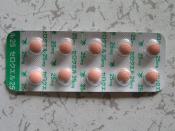SWOT analysis of AstraZenecaStrengthsAstraZeneca's key products were Crestor, Nexium, Seroquel, Arimidex, Pulmicort, Symbicort in 2007 Annual Report. The sales of Crestor, Merrem, Seroquel increased significantly in 2007 but the current block-busters of the firm is Nexium. The company has strong focus on Research and Development; it employs 13,000 people at its research facilities, furthermore made acquisitions related to R&D by purchasing Kudos Pharmaceuticals, Cambridge Antibody, Medimmune and Arrow Therapeutics. By putting emphasis on drug research, the company invests into the future in order to find new components. Due to the strong financial performance of the company it is able to provide the financial resources necessary for developing new medicines and investments required to reach new markets.
WeaknessesPatent ProtectionAs the patent protection of actual star products expire they must be replaced by new developments to maintain the high revenue of the firm. AstraZeneca's need for new components grow to retain and increase its market share and competitiveness.
Legal casesAstraZeneca has been fined â¬60 million by the European Commission for manipulating patent laws to keep competitors out of the market, marking the first occasion that antitrust laws have been used to combat patent abuse (in-pharmatechnologist.com n.d.). The firm must be prepared to handle legal questions, such as: outcomes of litigations or difficulties in obtaining and maintaining regulatory approvals for new products. There have been numerous patent protection litigations in the US; Seroquel, Prilosec or Crestor in 2007 when AstraZeneca filed patent infringement suits against seven companies that submitted abbreviated new drug applications (ANDAs) seeking to market generic versions of its cholesterol drug before the patents expire. Unlucky outcome of government investigations could harm the company's prestige, as it happened in 2003 when AstraZeneca admitted to criminal conspiracy to violate the Prescription Drug Marketing Act in the US.


